Says Director Dr. Seo of Pyungkang Korean Medicine Hospital
By Senior Editorial Writer Kim Hyung-dae
Highly contagious disease, COVID-19, is wracking havoc on many countries around the world—claiming 308,569 deaths as of May 17, 2020. The total affected cases worldwide are 4,588,914 and 308,569 persons died--and the mortality rate is 6.72%.
In Korea, the people and government have been handling the cases vert well, and the records show 11,037 affected, 9,851 cured, and 262 dead (mortality rate: 2.37%.)
At this time, it might not be amiss to shed light on the Oriental medicine reportedly effective in controlling COVID-19.
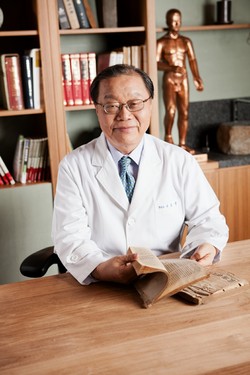
The person in point is Dr. Suh Hyo-suk of the Pyunkang Korean Medicine Hospital in Seoul, who has recently made an interesting disclosure.
He states that Korean Oriental medicine is useful in controlling the dreaded COVID-19.
Dr. Seo says: “Pneumonia is the disease of the respiratory organs that include the nose, throat, trachea, bronchus and the lungs. Pneumonia is caused by pneumonia germs and the flu by virus. The pneumonia viruses consist of many different kinds while the flu viruses have over 200 kinds.
“In the case of the Wuhan pneumonia (COVID-19), it begs comparison in the fact that, while it is caused by virus, it caused pneumonia.
“In general, viruses seldom go beyond the upper airway, COVID-19 viruses not only go beyond the upper airway but also penetrate the lungs—causing pneumonia. In this respect, COVID-19 is considered a disease where there is very slim chance of finding preventive or treatment measures.
“The only answer to protect ourselves from this situation seems to strengthen our immune system. Suppose the COVID-19 virus had infiltrated our body through our nose. Suppose the virus actually passed through our throat, bronchus, bronchial tubes, and the lungs.
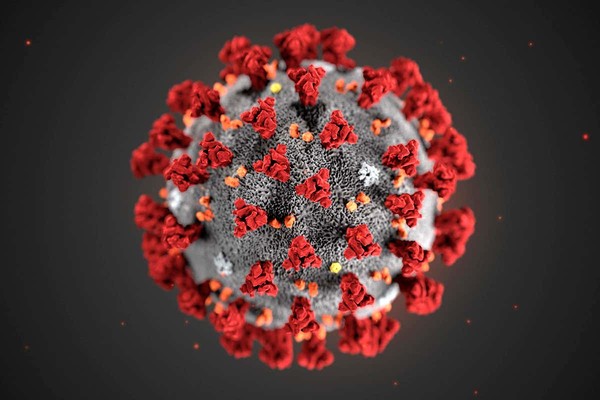
“The human body has the first defense line and it is our throat. If we can kill the virus at our throat, it means that we can keep our body safe from the COVID-19 viruses.’
There is a very expensive Oriental medicine item named Nokyong which means “Deer Antler.” According to an internet site, 600 grams of imported (Russian) deer antler is priced at more than one million won. Reports indicate that the price of the antler differs widely depending on the quality of the antler.
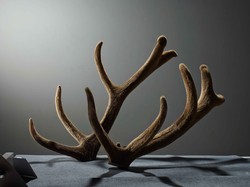

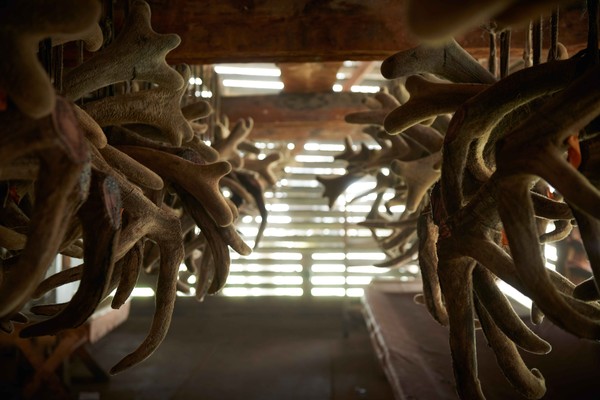
A news report of Haneui Sinmun (Oriental Medicine Newspaper) on March 19, 2020 says that Woosuk University donated 400 sets of dear antler (valued at 10 million won) to the Wanju County of Jeollabuk-do Province to be used in making Oriental medicine to treat COVID-19 cases.
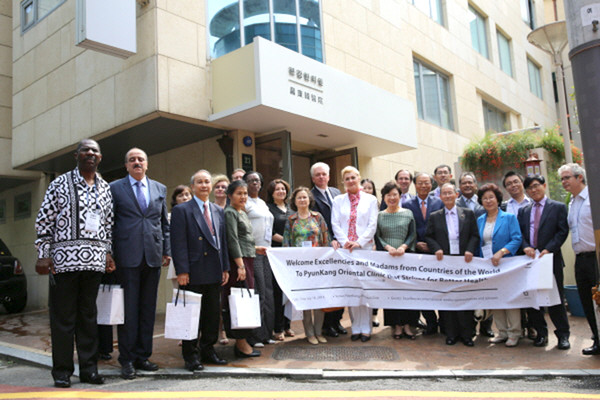
Making the donation, President Nam Chun-hyun Woosuk U. said, “We hope that it will be used in treating the COIVID cases whose immunity function might have been weakened due to the Corona disease. In response, Mayor Park Sung-il expressed warm appreciation for the precious donation for the treatment of the COVID cases.
So, Nokyong is used in Korea for the treatment of the COVID-19 cases.
And this view is shared by the Oriental medicine doctors in Korea.
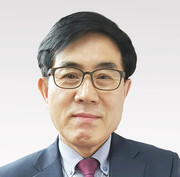
About Pyungkang Hospital:
The Pyunkang Korean Medicine Hospital in Seoul headed by Dr. Suh Hyo-suk was established originally in Sanbon in 1998.
After graduating from the School of Korean Medicine, he studied tonsillitis for 46 years to treat the patients suffering from the disease, including his own condition, and Pyunkang-Tang was developed as a result. The excellent efficacy of this medicine and the support shown by patients visiting our clinic led us to expand our clinic and establish branches in Ansan, Myeongdong and Seoeno.
Pyunkang-Tang and Pyunkang-hwan are exported to some 30 countries worldwide to be supplied to the overseas Koreans who trust the efficacy of these medicines, and it wouldn’t be an exaggeration to say that Pyunkang Korean Medicine Hospital has become an iconic oriental medicine brand of Korea
There have been a growing number of patients with atopic dermatitis from Japan visiting our Myeongdong Branen Whien opened in April 2008. Pyongkang also opened its branch hospital in Seoeno and its first overseas branch in LA simultaneously on Feb. 2, 2009, and this marked the hospital’s new beginning as a globalized oriental clinic.
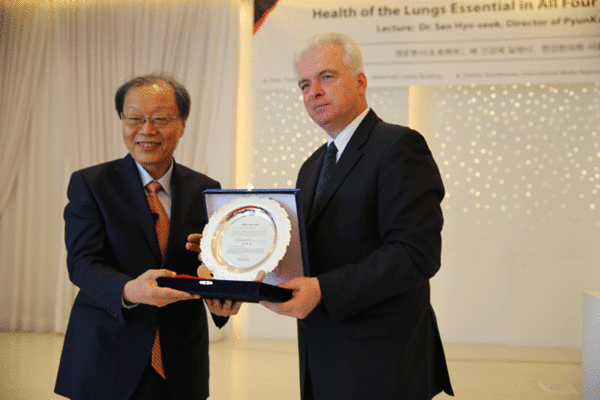
On Dec. 16, 2008, the Atopy and Pyunkang-Tang Oriental Medicine Research Institute was established in Japan, with the central role played by Dr. Shoyama (Doctor of Pharmacology) at Kyushu University, who is also the President of the Japanese Society of Pharmacognosy. These achievements would not have been possible had it not been for the public trust in Pyunkang-Tang and support for our clinic.
The objective of Pyunggang is to conduct ceaseless research on rhinitis, asthma and atopic dermatitis and ultimately contribute to the improvement of health for all mankind. Pyungkang also aims to globalize Oriental medicine, a proud part of Korean heritage.
“We believe that these feats are possible with your unwavering trust and support, so please continue to take interest in the clinic and encourage us as we endeavor to move forward,” asks Dr. Seo.
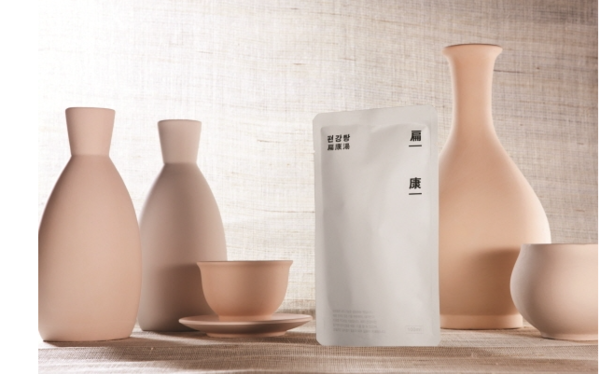
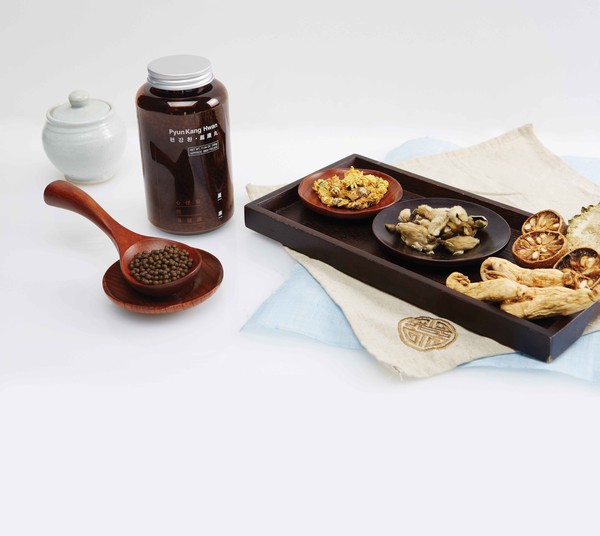
Health suggestions by Director Seo, Hyo-seok:
Living to the age of 100 with various illnesses is not something to desire:
Director Seo, Hyo-seok shares his advice on the path of healthy longevity with contemporary people who are dreaming of living healthily to the age of 100. By escaping from the dreaded clasp of 3 major allergic diseases including atopy, rhinitis and asthma and various adult diseases including pulmonary emphysema, fibrosis of the lung, bronchiectasis, arthritis, and diseases of thyroid, large intestine, kidney, auto-immune system, and cerebrovascular system. Let’s discover the clinical know-how he has accumulated over the last 40 years that even Qin Shi Huang sought after but failed to attain.
Dr. Seo, Hyo-seok is also the author of Miraculous Health Method, a steady seller in the area of health related literatures which has attracted more than 30,000 readers in Korea and China. In the book he introduces the health map for living to 100 years old in accordance with each disease. The author stresses that it is possible to prevent pneumonia, which is among the causes of sudden death, by preventing highly common ailment of common cold. He also points out that death in the middle of one’s life can be prevented through prevention of major diseases such as cancer, cerebrovascular system and heart diseases, which are the 3 major causes of death in Korea. By fortifying the cardiopulmonary functions, the tonsil can be activated thus fortifying high level immunity. Once we can prevent sudden death and death in the middle of one’s life, we are left to face only with death at old age. The book is filled with the principles of treating the pulmonary emphysema that indiscriminately eats up the pulmonary cells, pulmonary fibrosis that destroys the pulmonary cells by turning them into fibrous tissues and bronchiectasis that causes death due to difficulties in breathing because of excessive phlegm blocking the respiratory tract through oriental herbal medicinal treatments.
Protect your body by improving your lungs, most crucial organ for your body:
The common cold is a typical infectious disease of the respiratory system, and most people suffer from it at least a couple of times a year. However, just because it is prevalent, it doesn’t make it any less dangerous.
It is important that one understand the common cold is a source of various other diseases including tonsillitis, rhinitis, bronchitis, sinusitis, otitis media, conjunctivitis, asthma, pharyngitis, and pneumonia. The respiratory system is the primary route of infection, which can occur during breathing. When the immune system and self-healing power of the body are below the normal level, the respiratory system becomes susceptible to various attacks from foreign matter including microorganisms. The central role of the respiratory system is played by the lungs, which is also the most crucial organ for our qi.
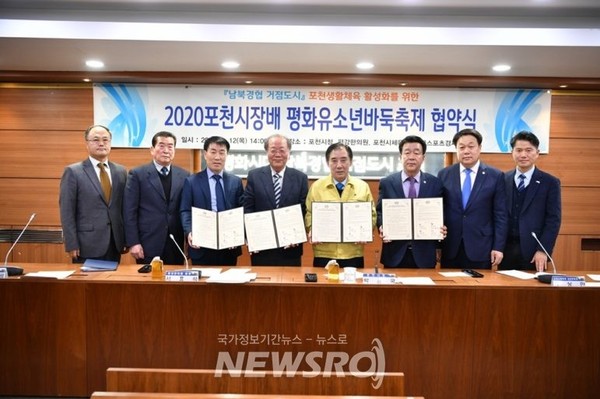
Neglecting the health of our lungs:
The lungs are the site of energy exchange between our bodies and the external environment, and maintain the energy of the body. In order to stay healthy, we need to promote the lung functions and enhance the amount of energy we receive from nature. However, most people only use 1/6 of the lung capacity, and this means that the contaminated air and foreign matter that penetrate the body cannot be filtered out. The reduced lung functions have a negative impact on the tonsils and airway, and weakened tonsil function means lowered immunity and greater susceptibility to rhinitis, asthma and pneumonia. Also, the lungs also affect the skin and lowered lung functions can lead to atopic dermatitis and acne.
The lungs are the most crucial organ in our body:
The main function of the lungs is to eliminate carbon dioxide and accept oxygen. Then, the oxygen is transported from the lungs to various parts of the body, including the organs, by the red blood cells (erythrocytes) in the bloodstream, while the white blood cells (leukocytes) help fight off the harmful microorganisms that enter our body such as bacteria, viruses, fungi and parasites.
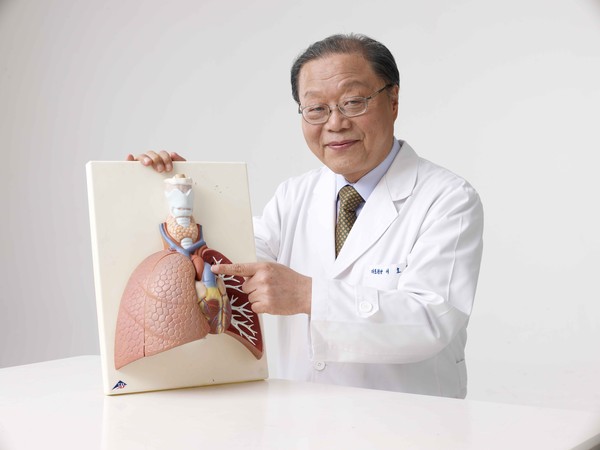
Proper administration of Pyunkang-Hwan:
As a Korean medicine doctor, it is always a rewarding experience to receive letters from our patients, expressing genuine appreciation for having their health restored, especially from chronic diseases such as severe cases of atopic dermatitis, with Pyunkang-Hwan. I have noticed something in common among these patients; they consistently took Pyunkang-Hwan with strong faith in its efficacy and effectiveness, and strictly adhered to the guidelines and recommendations.
There have been patients, who failed to abide by the guidelines and recommendations while taking Pyunkang-Hwan for a number of reasons and were unable to effectively treat their conditions such as atopic dermatitis. I empathize with these patients to a certain extent because to those suffering from severe diseases, the journey toward treatment and health restoration seems long and exhausting. Nevertheless, it is important for our patients to understand that the treatment process isn’t as difficult as it may seem, especially due to the nature of Pyunkang-Hwan, which is easy to take and for which there are no foods that must be avoided during its administration. As long as the guidelines and recommendations are observed, anyone can maximize its efficacy and receive all the benefits it has to offer.
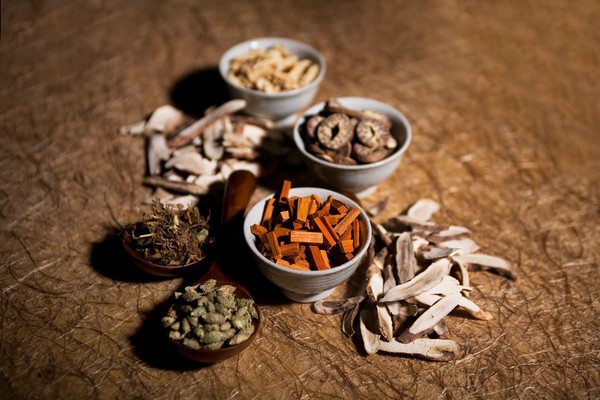
Having patience and faith in its efficacy:
Accompanied by three ministers and 3,000 followers, Hwanung, who was the son of Hwanin, the "Lord of Heaven," descended from Heaven to rule over the Earth. He was approached by a bear and a tiger, who earnestly asked him to change them into humans. They were given mugwort and twenty bulbs of garlic, and were told to “eat these inside a cave and stay out of sunlight for 100 days if you want to become humans.” Both the bear and the tiger agreed to the proposal; however, the tiger could not refrain from going outside the cave, while the bear stayed and was transformed into a woman on the 21st day. Hwanung married the woman and the two had a child together. It was Dangun Wanggeom.
The Danggun myth provides an important lesson on faith and patience; it shows that being naïve and honest like the bear in the story leads to more positive outcomes than being trivially clever like the tiger. Both animals were told to stay out of sunshine for 100 days, while eating only mugwort and garlic inside a cave, but the tiger couldn’t last for more than 20 days, whereas the bear was granted its wish in just 21 days. Although the tiger was just as earnest as the bear in its desire to transform into a human, its failure was rooted in the doubt as to whether the transformation would actually occur and the temptation of eating delicious meat instead of just mugwort and garlic. On the other hand, the bear with faith and patience was granted its wish in just 21 days after completing 1/5 of the 100-day process. Let’s imagine what could have possibly happened next. After witnessing the bear transform into a human, the tiger re-visited Hwanung, begging him to give it another chance. Once it was granted a second chance, the tiger went inside the cave with great anticipation, but it left the cave again in just 22 days this time. It was because it expected to transform into a human after 21 days just like the bear, but when that didn’t happen, it simply gave up just like the last time. But had he resisted the temptation and followed the instructions for just one more day, Hwanung would’ve granted its wish to transform into a human.
As such, one needs to have faith, conviction and patience while taking Pyunkang-Hwan. I am not suggesting that you trust it blindly; I am suggesting that you look at the countless cases of patients who got better after taking Pyunkang-Hwan and believe that you can become one of them. Many of our patients suffering from atopic dermatitis come to us after visiting famous clinics and trying out medicines with positive feedback, and one of the common problems is that these patients believe Pyunkang-Hwan as just “one of the medicines with good reviews.” If Pyunkang-Hwan were just “one of them,” it would have been impossible for it to treat countless patients and be globally recognized for its efficacy and effectiveness. You must truly understand the nature of Pyunkang-Hwan, the efficacy of which has been proven clinically for over 40 years, and have firm conviction that it will also effectively restore your health.
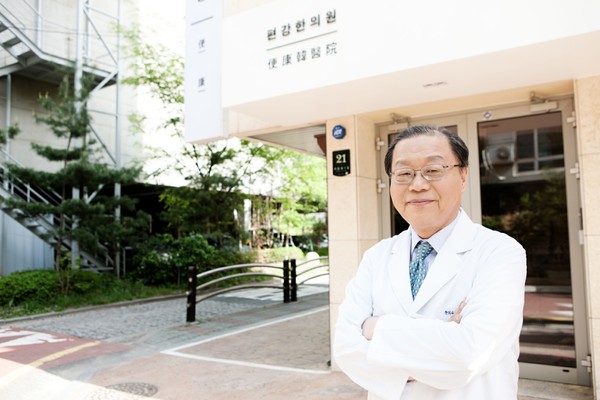
Treatment principles of Pyunkang-Hwan, which eliminates the underlying causes:
Another important matter to note is that you must understand the therapeutic principles of Pyunkang-Hwan. Pyunkang-Hwan strengthens one’s immune system by reinforcing the pulmonary function and promoting the oriental qi, while at the same time helps discharge the toxins outside the body in order to treat atopic dermatitis. This is accompanied by a healing crisis resulting from the elimination of toxins, which inevitably occurs during the treatment process. A patient may develop doubts as to the efficacy of the medicine and opt to use steroid-based ointments to ease the severe itchiness, but this is strongly advised against as it means that your previous efforts will have been in vain.
Such healing crisis would not occur if Pyunkang-Hwan were a medicine that “apparently” treated the condition. In reality, Pyunkang-Hwan is a medicine that causes the discharge of toxins in order to eliminate the underlying causes of the disease and prevent recurrences. At this point, one should be able to infer the importance of inducing perspiration as it is a well-known fact that sweating is a way that the body eliminates waste.
But the problem is in order for us to sweat, our body temperature must rise, which actually aggravates the itchiness experienced by patients with atopic dermatitis. If one doesn’t make the effort to induce perspiration in order to avoid this, Pyunkang-Hwan won’t be nearly as effective. The best way to cause sweating is to exercise, but going to a charcoal sauna is perhaps an easier approach for most patients. It is uncommon for a ship to capsize or sink in the middle of the ocean unless it encounters a strong typhoon. It is actually more likely for sinking to occur near the harbor as the waves tend to be higher and the area is dense with reefs and submerged rocks.
It is a mistake to consider Pyunkang-Hwan as a cure for all diseases or as a medicine that guarantees health restoration through simple administration. Coming across Pyunkang-Hwan is similar to boarding a ship that is certain to enter into a port and a healing crisis is like the waves, reefs and rocks indicating that you are close to your destination. Do not be afraid to come on board or jump off midway like the tiger. Think of the joy awaiting you at the destination and hold on tight with faith and patience.

